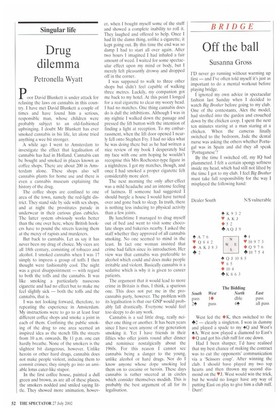Drug dilemma
PetroneIla Wyatt
Poor David Blunkett is under attack for relaxing the laws on cannabis in this country. I have met David Blunkett a couple of times and have found him a serious, responsible man, whose children were probably subject to an old-fashioned upbringing. I doubt Mr Blunkett has ever smoked cannabis in his life, let alone tried anything a wee bit stronger.
A while ago I went to Amsterdam to investigate the effect that legalisation of cannabis has had in Holland. Cannabis can be bought and smoked in places known as coffee shops. There are about 200 in Amsterdam alone. These shops also sell cannabis plants for home use and there is even a cannabis museum explaining the history of the drug.
The coffee shops are confined to one area of the town, namely the red-light district. They stand side by side with sex shops, and at night the prostitutes parade in underwear in their curious glass cubicles. The latter system obviously works better than the one over here, where British hookers have to pound the streets leaving them at the mercy of rapists and murderers.
But back to cannabis. Let us say it has never been my drug of choice. My vices are all 18th century, consisting of tobacco and alcohol. I smoked cannabis when I was 17 simply to impress a group of toffs 1 then thought were fashionably cool. The night was a great disappointment — with regard to both the toffs and the cannabis. It was like smoking a particularly nauseous cigarette and had no effect but to make me feel slightly sick — both the toffs and the cannabis, that is.
I was not looking forward, therefore, to repeating the experience in Amsterdam. My instructions were to go to at least four different coffee shops and smoke a joint in each of them. Confining the public smoking of the drug to one area seemed an inspired idea as the stench fills the streets from 10 a.m. onwards. By 11 p.m. one can hardly breathe. None of the smokers is the slightest bit dangerous, however. Unlike heroin or other hard drugs, cannabis does not make people violent, inducing them to commit crimes; they simply go into an amiable lotus eater-like stupor.
In the first coffee house, painted a dull green and brown, as are all of these places, the smokers nodded and smiled saying little. They showed more animation, howev
er, when I bought myself some of the stuff and showed a complete inability to roll it. They laughed and offered to help. Once I had lit the damn thing, unlike a cigarette, it kept going out. By this time the end was so damp I had to start all over again. After two hours I imagined I had inhaled a fair amount of weed. I waited for some spectacular effect upon my mind or body, but I merely felt pleasantly drowsy and dropped off in the corner.
I was supposed to walk to three other shops but didn't feel capable of walking three metres. Luckily, my companion got me back to my hotel. At this point I longed for a real cigarette to clear my woozy head. I had no matches. One thing cannabis does do is dull the inhibitions. Although I was in my nightie I walked down the passage and pressed the lift button with the intention of finding a light at reception. To my embarrassment, when the lift door opened I nearly fell onto Stephen Fry. I had no idea what he was doing there but as he had written a nice review of my book I desperately hid my face with one arm hoping he wouldn't recognise this Mrs Rochester-type figure in a nightdress. I got my matches, though, and once I had smoked a proper cigarette felt considerably more alert.
The next morning the only after-effect was a mild headache and an intense feeling of laziness. If someone had suggested I should burgle a house I would have turned over and gone back to sleep. In truth, there is nothing less inducing to physical activity than a few joints.
By lunchtime 1 managed to drag myself out of bed and went to visit some chocolate shops and bakeries nearby. I asked the staff whether they approved of all cannabis smoking. No one seemed to mind in the least. In fact one woman insisted that crime had fallen since its introduction. Her view was that cannabis was preferable to alcohol which could and does make people irritable and violent. Basically cannabis is a sedative which is why it is given to cancer patients.
The argument that it would lead to more crime in Britain is thus, I think, a spurious one. This does not put me in the procannabis party, however. The problem with its legalisation is that our GNP would probably fall drastically. Everyone would feel too sleepy to do any work.
Cannabis is a sad little drug, really neither one thing or another. It has been years since I have seen anyone of my generation smoking it. Yet I have friends in their fifties who offer joints round after dinner and reminisce nostalgically about the 960s. For this reason I cannot see cannabis being a danger to the young, unlike alcohol or hard drugs. Nor do I know anyone whose dope smoking led them on to cocaine or heroin. These days cannabis is rather sneered at in circles which consider themselves modish. This is probably the best argument of all for its legalisation.
































































 Previous page
Previous page